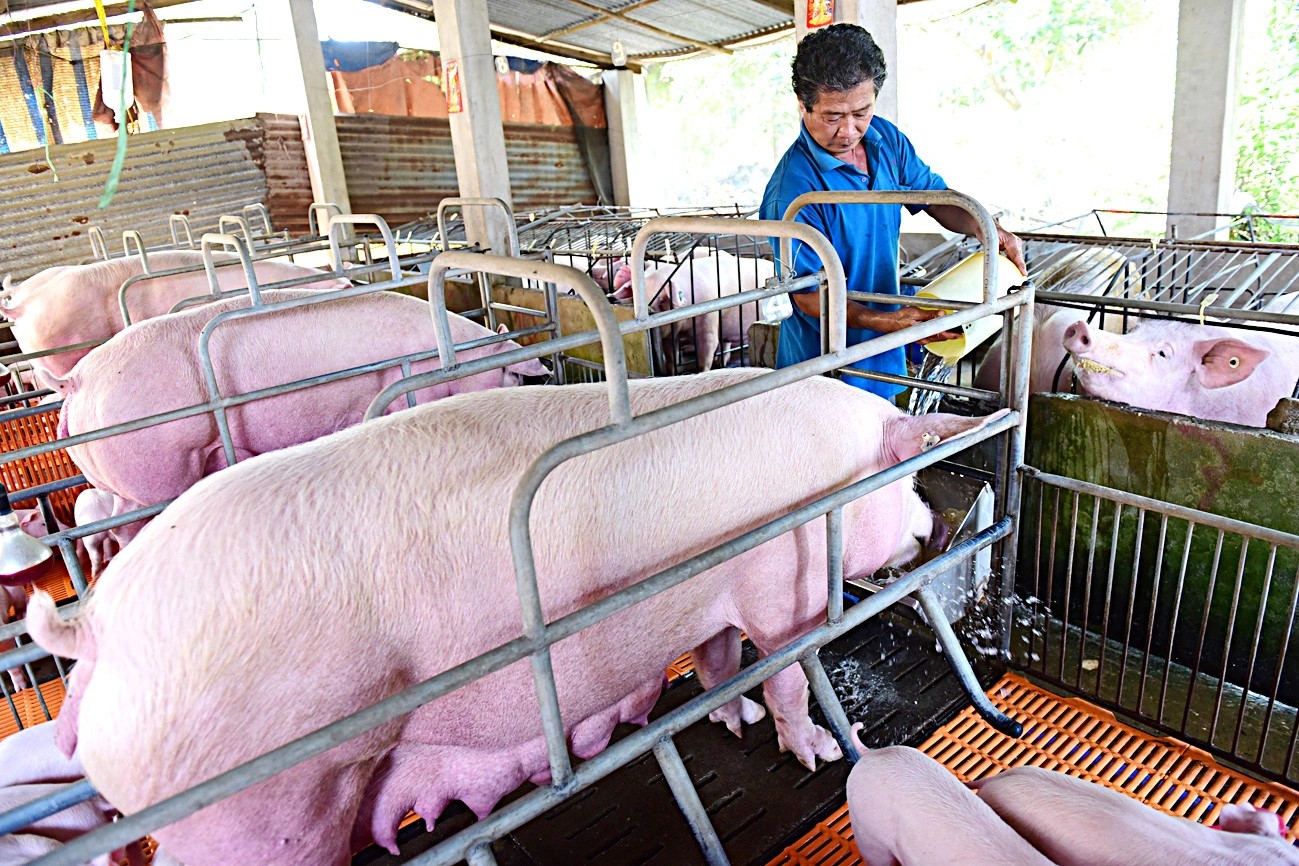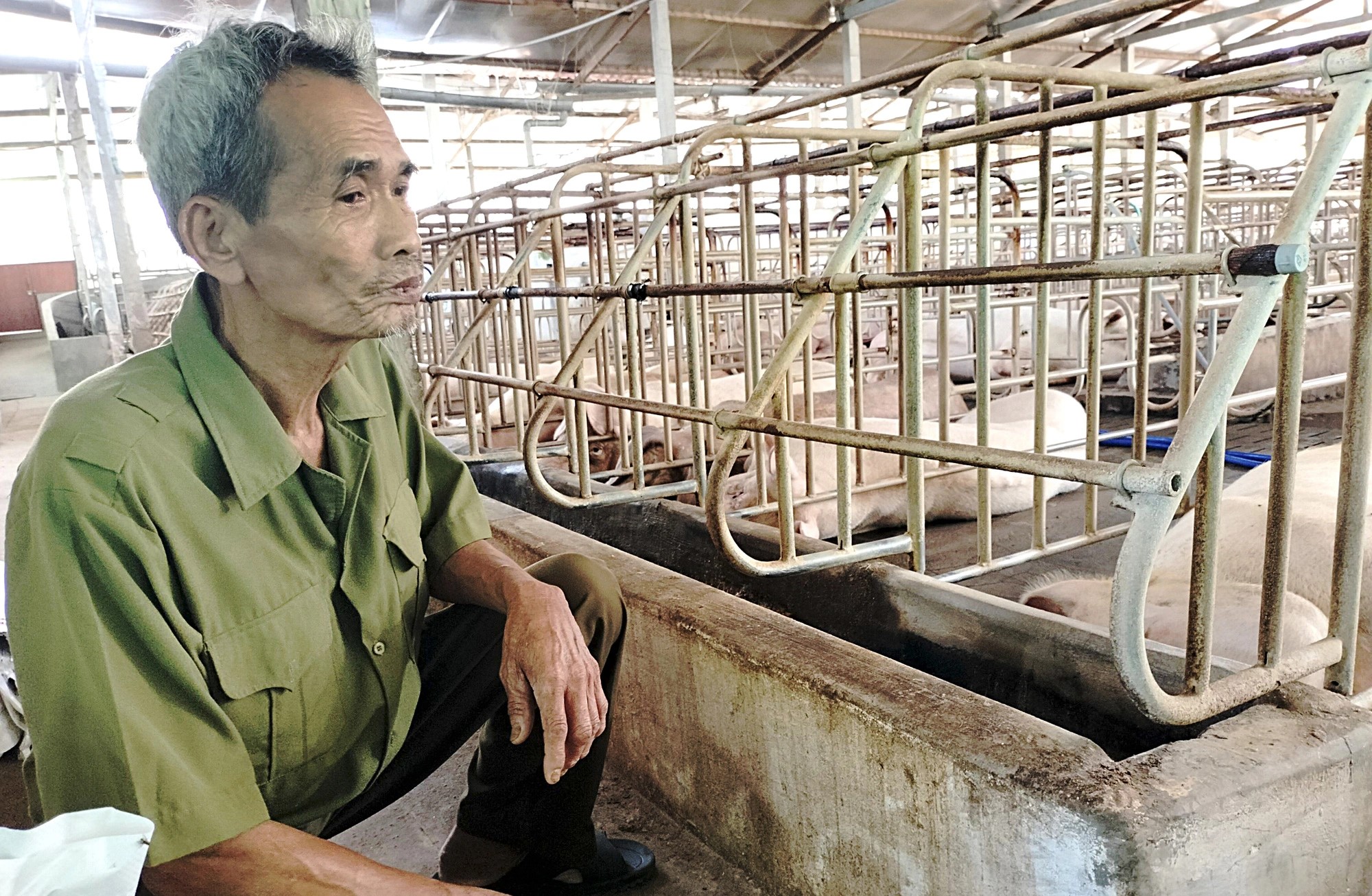Farmers raising swines are facing the persistent threat of the African swine fever pandemic, which has been ravaging their herds throughout the final months of 2023 in southern Vietnam.
Alongside this challenge, an unfortunate increase in animal feed prices has compounded the difficulties faced by these farmers.
Sadly, Nguyen Thi Sang from Binh Giang Commune, Hon Dat District, Kien Giang province, with two decades of experience in pig farming, expressed the heart-wrenching scene of her herd being executed due to the African swine fever.
The economic impact intensified as feed prices for animals increased simultaneously, causing substantial losses for farmers.
As 2023 came to a close, Sang faced a challenging decision to cull her herd of pigs, each weighing between 80-100 kilograms, due to the persistent African swine fever.
Currently, the price for a live pig is between VND4.9-5 million (US$200), representing a decrease of over VND400,000 ($17.39) compared to the same period last year.
Nguyen Dinh Xuyen, deputy chief of the livestock and veterinary unit of Kien Giang Province, reported 12 outbreaks of African swine fever in five districts in 2023, necessitating the destruction of 168 pigs.
Despite the outbreaks, the disease has not reappeared after 21 days, and Xuyen made reassurances that the supply of pigs would not be significantly impacted.
“The outbreaks in 2023 were not large but persisted throughout the year.
"Despite these challenges, the input cost and the sales price of pigs has remained relatively stable, ranging from VND4.8 - 5 million ($208.7 - 217.39) per pig. This has resulted in households raising pigs experiencing little to no benefit, or even losses.
"On the other hand, pig farms with lower costs can still turn a profit,” explained Xuyen.
In a similar vein, the herd of pigs raised by Nguyen Thi Nga, a farmer in Long Phuong Commune, Long Ho District, Vinh Long Province, suffered from African swine fever.
With 63 pigs diagnosed with the disease, Nga had to make the difficult decision to cull the infected animals.
Despite local authorities implementing measures to contain the outbreak, Vinh Long has experienced seven outbreaks to date.
Small but persisted outbreaks
According to Nga, observing the herd of pigs refusing to eat, she administered medicine by needles, but the disease persisted.
After confirmation from local veterinarians that her herd of pigs had contracted African swine fever, Nga had to accept the difficult task of getting rid of them.
Lam Minh Hoa, head of Soc Trang Sub-Department of Livestock and Veterinary Medicine, reported eight outbreaks in 2023, a notable decrease from the previous year.
Due to the limited range of the outbreaks, local authorities were able to control them promptly.
In Dong Nai, the national hub for pig farming with nearly 2.3 million animals, some small outbreaks of African swine fever have been reported, especially in households and farms.
A representative from Dong Nai Sub-Department of Livestock and Veterinary Medicine, mentioned that, while the disease outbreaks previously occurred mainly in households, they are now also reported at the livestock farming level.
Fortunately, initiative-taking measures have prevented the disease from spreading.
 |
| Some farmers seem reluctant to use the vaccine due to concerns about its effects. Photo: Quang Dinh / Tuoi Tre |
Farmers still not interested in vaccines
In 2023, there were 714 outbreaks of African swine fever across 45 provinces and cities nationwide, resulting in approximately 34,500 pigs being culled, according to data compiled by the Department of Animal Health, a governmental agency of the Ministry of Agriculture and Rural Development.
The number of outbreaks and culled pigs decreased by half compared to the same period last year.
The department cited various reasons contributing to these outbreaks, including the small scale of households raising pigs, failure to meet standard biological safety requirements, and farmers not reporting their livestock farmings to local authorities.
In areas where authorities did not implement campaigns against the outbreaks as per guidelines from the Ministry of Agriculture and Rural Development and orders related to African swine fever from the prime minister, the risk of the disease reappearing and expanding remains high.
The department warned that, despite the ministry issuing an official document allowing the use of the African swine fever vaccine nationwide since July 2023, practical usage has been limited.
In some areas, farmers seem reluctant to use the vaccine due to concerns about its effects.
Ensuring adequate pork supply during Tet holiday
Nguyen Trong Tuyen, an official from the Deaprtment of Animal Husbandry under the Ministry of Agriculture and Rural Development, explained that the recent decrease in live pig prices, equal to or lower than the cost of raising, resulted from falling consumer demand.
However, there was an increase in the pork supply during the last three months of the previous year, spanning from September to November.
This uptick was attributed to the efforts of numerous enterprises and farming households who managed to maintain a high level of production during that period.
Tuyen made reassurances that current pig production rates are stable, and the supply is expected to meet the market demand for pork and pork-based foods during the upcoming Lunar New Year, or Tet, holiday.
Like us on Facebook or follow us on Twitter to get the latest news about Vietnam!






















































